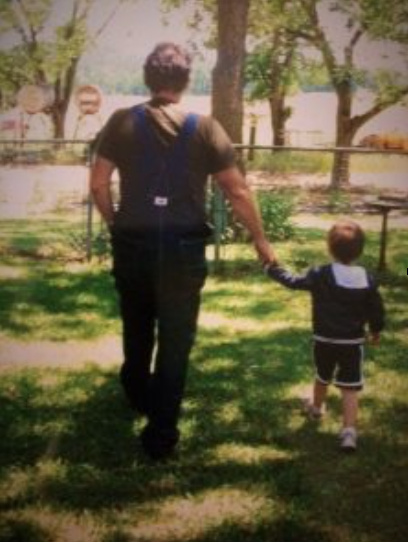What You Need to Know About Depression to Understand How My Father Died
 I remember the days and weeks after my dad passed away — feeling like everyone expected me to go back to life and just resume me routine as normal.
I remember the days and weeks after my dad passed away — feeling like everyone expected me to go back to life and just resume me routine as normal.
Yet, I didn’t feel normal.
I was now stuck with this heavy heart, and on top of that, I knew the day was coming when someone would ask, “How did he die?”
How was I going to answer that? Would I tell the truth? Would I make something up? Would I try to avoid the question all together?
When someone you love dies from taking their own life, you find out there is a stigma that surrounds the death. People have this prejudgment that you must come from a troubled family or that you must have done something wrong. They often have this preconceived notion that the person who took their own life was thoughtless about the loved ones they were leaving behind, or wonder why didn’t they just get help.
You can see the reaction in the person’s face when they asked how he died and you answer the truth. They have already started judging in that instant.
Suicide is a topic no one likes to talk about and certainly no one wants to be associated with. The day my dad took his own life, I joined this club of suicide loss survivors. Up until that point, I never really knew how many of us there were. According to SAVE.org, there is one death by suicide in the world every 40 seconds, yet you don’t hear about it much because it is often associated with shame and guilt.
This needs to change if we want to try to stop this epidemic.

The Stigma of Depression
I have learned that untreated depression is the number one cause of suicides. Because the wounds and scars of a mental illness are invisible, people often question whether someone is really struggling. Those who are struggling with it often feel ashamed because they should be “strong enough to fix it.” Before I started really learning about depression, I couldn’t understand why a depressed person couldn’t just “snap out of it.” I mean, it’s a choice to be depressed, right? In my small-minded thinking, I felt like sure, there were days I wanted to just be sad because I had had a few tough breaks, but I made a choice to wake up, “deal with it” and move on with my day. It was that simple in my mind.
The problem is it’s not that simple.
No one chooses to be depressed just like no chooses to have cancer or to get into car accident. Depression is a mental disability that can distort so much of your thought process that rational thinking can sometimes be no longer possible. Relationships are difficult if not sometimes impossible to maintain. Your mental stability has become so tormented that it is now physically painful. You can feel like an outcast. On top of this, it’s seen as such a shameful condition that you are often too embarrassed to get help — so instead you live each day with this ongoing agony.
Those who have depression don’t want to end their life, but rather the very thought of existence has become so painful that ending their life ironically feels like a way to survive.

The Stigma of Suicide
It goes against our human nature to want to die, so why do people so often label this cause of death selfish?
If you have never lost someone close to you in this manner, please don’t judge what their motives were or what the situation was. Not one single story of suicide is the same. I can’t speak for every case of suicide, but I have learned quite a bit through my experience. I know that often times, people feel like ending their life will create less of a burden on others. They feel like those around them would be better off if they are gone. They do this because in their distorted way of thinking, they feel like they are taking care of their loved ones.
I wish my dad and so many others would have reached out to someone to confide about what they were going through, but I think sometimes you feel like you are so far lost, you aren’t sure you can ever really be found.
But it doesn’t have to be that way.
Make a difference. Even if it’s a small one.
Today’s society may tell you that you have to just take care of yourself. Don’t fall for that. Everyone wants to feel love, compassion and self-worth. Take time out of your day to brighten someone else’s every chance you can. Show love to others even when you think they don’t deserve it. Reach out to someone you think might be hurting. Let that person who’s isolating them self know you notice them. Not only will it have a positive impact on you, you have no idea what it may mean to them.
Good Advice.
 The day after my dad passed away, one of my very best friends gave me some good advice. Her son had just battled cancer for the past year (his one year scans just came back clear!), and knew what it was like to have people judge her life through a microscope, when in reality they could only see through the lens of a telescope. She told me, “People will say the rudest, most ignorant things to you, but love them anyway. They usually don’t know what to say and so they just say the first thing that comes to their head.”
The day after my dad passed away, one of my very best friends gave me some good advice. Her son had just battled cancer for the past year (his one year scans just came back clear!), and knew what it was like to have people judge her life through a microscope, when in reality they could only see through the lens of a telescope. She told me, “People will say the rudest, most ignorant things to you, but love them anyway. They usually don’t know what to say and so they just say the first thing that comes to their head.”
And they did.
But on the flip side of that, I had people who reached out to me who I never expected to. I had people who I didn’t know pray for my family. I had other parents from my son’s classroom and our neighbor bring us dinner. I had my women’s group at church bring gift cards so I wouldn’t have to cook. I had people who provided me with things that would help me remember my dad. I had a husband who supported me and gave me time to be a child in mourning while he took on the roles of both mom and dad. I had people show me love when I was in my darkest moments and could give them nothing in return.
And in those moments, I saw God move.
There is a verse in Proverbs (30:8b-9) that says this, “Give me just enough to satisfy my needs. For if I grow rich, I may deny you and say, ‘Who is the Lord?’ And if I grow too poor, I may steal and thus insult God’s holy name.”
On the days that seemed too hard for me to handle, He always seemed to give me just enough to help get me through it. It may have been a perfectly timed text that I needed from a friend, a sign that I had been praying for or a song that said just the right lyrics. I know that He provided all of those little reminders to show that no matter what, He was there.
If you or someone you know needs help, visit our suicide prevention resources page.
If you need support right now, call the National Suicide Prevention Lifeline at 1-800-273-8255 or text “START” to 741-741.
We want to hear your story. Become a Mighty contributor here.
Images courtesy of Jennifer Guajardo

